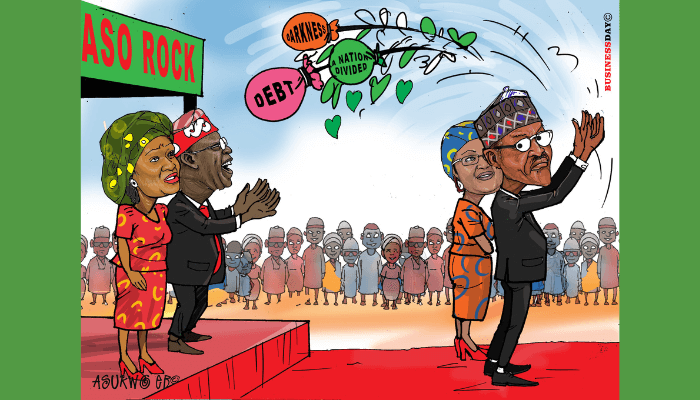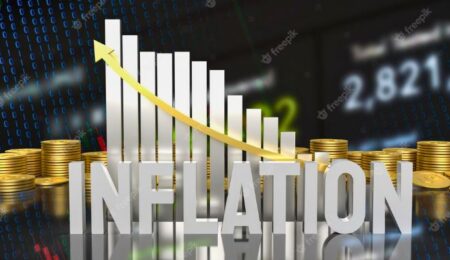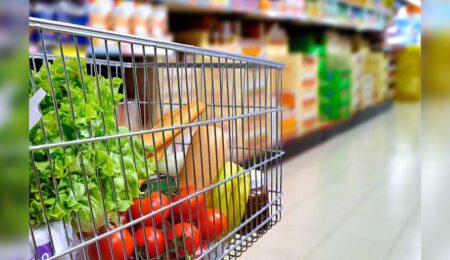“Whoever wins this election, loses.” Those were the words a foreign diplomat who has lived in Nigeria for 20 years used in depicting the arduous task ahead of Nigeria’s next leader and it is the reason many believe President-elect Bola Tinubu must hit the ground running from day one.
Tinubu, whose victory is still being contested in court, may have secured the weakest mandate of any Nigerian leader since 1999 on his way to victory, but he also landed what some describe as arguably the world’s toughest job.
In a week’s time, Tinubu will officially take the reins of an ailing nation that has been starved of badly-needed economic reforms.
The country’s economic rot has come to a head after years of warning signals and Tinubu will not have the luxury of papering over the cracks like several leaders before him.
His immediate predecessor, Muhammadu Buhari, borrowed to the hilt to keep the taps open on spending but that has left a huge burden for his successor.
Critics say there is little to show for Buhari’s excessive borrowing, but for Tinubu who inherits three times more debt than Buhari did when he was first elected in 2015, his concern will be how to boost revenues since he can’t borrow as much as Buhari did without worsening a precarious debt burden.
Of every N100 that Nigeria earned in 2022, N92 was used to repay creditors, according to the International Monetary Fund (IMF), which predicts that the country’s debt service costs could swallow 100 percent of government revenues by 2026.
Tapping the central bank for bailout funds is also not an option for Tinubu, not after Buhari took an unprecedented and unlawful N22.7 trillion in the CBN loans, which have only just been controversially added to the country’s debt profile and converted to bonds repayable over decades.
Buhari also did Tinubu no favours by dragging his feet on unpopular and painful reforms that critics said could have been done after he clinched his second term ticket in 2019. One example of such reforms is the petrol subsidy removal.
Nigeria has resisted wise counsel and continued to subsidise petrol despite the fiscal mess it has created for the cash-strapped government.
Tinubu, who promised to halt the practice if elected, now has the unenviable task of biting the bullet and risking the ire of Nigerians, many of whom did not vote for him.
There’s also the difficult task of rebuilding investor confidence in the country’s broken foreign exchange market, where the gap between the official rate and parallel market rate is over 60 percent and legitimate businesses are forced to rely on the black market to meet their dollar needs. The system has spooked foreign investors and denied Nigeria’s FX market of much-needed liquidity. An investor who exited Nigeria last year likens the FX market to a “circus.”
“Tinubu is viewed positively in the international community based on his record in Lagos as some expect a commercial and business-minded orientation,” a former senior government official told BusinessDay.
“He will still have his work cut out though in making Nigeria investable again. Nigeria is considered uninvestable right now and that’s what I hear everywhere I go,” the person said. “Nobody will take us seriously until the current mess with FX is addressed.”
Investors who have their money stuck in Nigeria due to the acute dollar shortages that have stalked the country since 2016 are not considering reinvesting, neither are the ones who managed to get their money out at the nick of time.
Tinubu will have the delicate task of assuring investors of the safety of their capital, in addition to collapsing the multiple exchange rates that have caused confusion for local and foreign investors.
“There is no easy way out for Nigeria this time when you consider the damage that has been done in the last eight years,” Muda Yusuf, CEO of the Centre for Promotion of Private Enterprise (CPPE).
“The country is at a point where the government must implement reforms or perish,” Yusuf said.
Tinubu’s inauguration next week is unlikely to elicit the great fanfare that greeted that of Buhari, who in 2015 notched nearly double the total votes secured by the former Lagos state governor on his way to pulling off an unprecedented victory over an incumbent president.
Tinubu’s victory – clinching 8.79 million votes at the poll – is the lowest of any president since 1999. Now he must walk the tightrope of pushing unpopular reforms.
The following charts depict the task ahead for Tinubu and why his job is being considered as the world’s toughest job.
Mind the gap: Nigeria’s convoluted FX market
The gap between the official rate of the Nigerian naira and parallel market rate is over 60 percent. Several false attempts to merge the rates and gradually instill confidence in the market have failed. The naira sold for 755 per US dollar at the black market on Friday while the official rate closed at 461 per US dollar.

Too broke to build infrastructure
Nigeria has a gaping infrastructure deficit that requires investment of $3 trillion across key sectors over 30 years to close the gap.
The infrastructure deficit, which has swelled due to low funding, has rendered many Nigerian businesses uncompetitive and is a deterrent to businesses.
Nigeria’s capital expenditure as a percentage of GDP is dwarfed by that of Kenya, Ethiopia, Ivory Coast and Ghana.
As a percentage of GDP, Nigeria spent an average of 2.2 percent on capital projects between 2015 and 2022.

Economy not growing fast enough
The cumulative average growth rate (CAGR) of the economy is extremely low for a developing country or frontier market like Nigeria. At 0.9 percent Nigeria’s average economic growth is again dwarfed by that of Kenya, Ethiopia, Ivory Coast and Ghana.
In real terms, the economy has grown since 2012 due to structural issues and challenges and an average Nigerian has less income in 2023 than in previous years.


Out of favour with foreign investors
Nigeria’s trouble attracting foreign capital is well documented with the FX market seen as the single most important factor inhibiting foreign investment inflows.
In 2022, Nigeria could attract only $5.3 billion, the lowest in three years, according to data from the National Bureau of Statistics.

A drop of water in an ocean
Nigeria’s budget has jumped in the last eight years but remains too little for an economy the size of Nigeria’s.
In 2022, the government’s expenditure to GDP was 14.27 percent. Although it’s the highest since 2018, the amount spent falls short when compared with the average amount spent by frontier markets, which is 30 percent of GDP. 
Biting more than it can chew
Nigeria is increasingly spending more than it earns but while that may not be the real problem, given that most countries have to borrow to meet spending targets, the worry is that the government is not spending efficiently. A case in mind is the petrol subsidy, which gulped more cash last year than the health and education budgets combined.
Nigeria’s reckless spending has led to a widening budget deficit, which hit 6.3 percent of GDP in 2022.

Private capital is not flowing to infrastructure
Nigeria is not attractive for private investments and that reality is laid bare in data showing that private investments in the country’s infrastructure is a paltry $14 billion. That compares with $27 billion for South Africa, $74 billion for Indonesia, $96 billion for Mexico, $155 billion for Turkey and $286 billion for India, according to data from the World Bank.

image.png
Read also: Buhari’s eleventh-hour economic decisions seen cornering Tinubu
Too risky to handle
Investors demanded the highest return in four years from Nigeria to be holders of its debt last month, another signal that the country’s borrowing spree has come to a head.
The country’s risk premium has joined the league of countries with the world’s highest including Yemen, Syria, Venezuela, Sudan, and Lebanon, according to country risk premium ratings by Moody’s Investors Service and New York University.
The extra compensation investors demand to hold Nigeria’s benchmark 10-year bond rather than the 10-year US Treasury hit 11.8 percent in April 2023, the highest since 2019, according to data compiled by BusinessDay.
“Investor’s confidence in Nigeria’s market is currently at historic lows and the next government will struggle to raise capital,” said Damilola Adewale, a fixed income and currency research analyst familiar with sub-Saharan Africa. “For Nigeria, it means any security, especially bonds issued in the international capital market, would be priced at a high rate by investors.”
image.png

Nigeria is home to the world’s highest number of out-of-school children
A record 20 million children did not go to school in Nigeria last year, a stark sign of the government’s lack of investment in education. University teachers also downed tools and stayed away from classrooms for eight months in 2022. Education will need to get more attention if Tinubu is to succeed in creating jobs and boosting economic growth.

Nigerians are not as healthy as their peers
Nigeria has the lowest life expectancy of peer countries at 53.8 years. That compares with the average life expectancy of 60.4 in South Africa, 61.3 in Ghana and 67.4 in Ethiopia.

Nigeria has highest unemployment rate in Africa
Nigeria’s unemployment rate is the highest in Africa and exposes the government’s reluctance to leverage the private sector as an engine for job creation and economic growth.


Inflation rising at blistering pace
Nigeria’s inflation problem is not unique to it but it remains one of the highest in Africa and has been above the CBN’s preferred target of between 6-9 percent since 2015.
image.png






